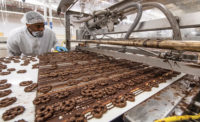Nellson Nutraceutical triples in size through focus on nutrition segment, aggressive acquisition strategy
Nutrition bar maker has roots in confectionery industry.

Nellson Nutraceutical’s focus on the nutritional bar and shake categories, along with an aggressive acquisition strategy, has pushed the co-manufacturing company to triple in size.
Photos by Vito Palmisano

Nellson Nutraceutical’s focus on the nutritional bar and shake categories, along with an aggressive acquisition strategy, has pushed the co-manufacturing company to triple in size.

Jean Filion, coo and president of Nellson Canada, walks with Associate Editor Alyse Thompson in a state-of-the-art control room.

A Nellson employee prepares to monitor a vat fi lled with a binding syrup for bar ingredients such as cereal.

A Nellson employee prepares to monitor a vat fi lled with a binding syrup for bar ingredients such as cereal.

Drum rollers fl atten long sheets of a bar base layer before a thin layer of caramel is spread on top.

Drum rollers fl atten long sheets of a bar base layer before a thin layer of caramel is spread on top.

Drum rollers fl atten long sheets of a bar base layer before a thin layer of caramel is spread on top.

Nellson has the capability of producing bars with multiple layers in addition to top and bottom coating and drizzle.

Once the layers are spread out, the long sheets of bars are cut into long strips before being cut into the fi nal bar shape. The bars then head to the chocolate enrober.

Once the layers are spread out, the long sheets of bars are cut into long strips before being cut into the fi nal bar shape. The bars then head to the chocolate enrober.

Bradley Shields, senior director of manufacturing, looks over bars that have been coated and cooled and are heading toward packaging.

Bradley Shields, senior director of manufacturing, looks over bars that have been coated and cooled and are heading toward packaging.

Once flow wrapped, completed bars are put into boxes by a pick and place machine. Each of Nellson's lines has its own packaging equipment.

Bradley Shields, senior director of manufacturing, illustrates the size of the warehouse at Nellson's manufacturing facility in Ontario, Calif. Nellson officially opened its plant there in March.

















Nellson Nutraceutical produces nutrition bars and functional powders for major brands and retailers across the United States and Canada — but it hasn’t always been that way.
The Anaheim, Calif.-based company’s origin is in the confectionery industry. Founded in 1962 by the Nellson family, Nellson Candies, as it was known then, made a mix of chocolate and non-chocolate products, among them AstroPop lollipops.
However, a glimpse into Nellson’s future came through a partnership with late health guru and free spirit Gypsy Boots. Yes, that’s right. Gypsy Boots.
At-A-Glance: Nellson Nutraceutical, LLC
Headquarters: Anaheim, Calif.
Products: Nutrition bars, functional powders
Manufacturing sites: Anaheim, Calif.; Ontario, Calif.; Salt Lake City, Utah; Lachine, Montreal, Canada; Anjou, Montreal, Canada.
Leadership team: Jamie Better, ceo; Jean Filion, coo, president – Nellson Canada; Bart Child, senior v.p.-commercial development; Manuel Martinez, cfo; Martha Hudak-Roos, v.p.-quality and food safety; Ray Collins, v.p.-human resources; Adam Schwinghammer, Vice President, powder.
Born Robert Bootzin, Gypsy Boots founded Health Hut, a first-of-its-kind health food store in Los Angeles in the late 1950s, counting Hollywood stars among its clientele. Bootzin was known for his Boots Bars, made with wheat grass, spirulina, garlic and home-grown Medjool dates.
Nellson Candies produced Bootzin’s natural bars, which weren’t totally unlike the nutrition bars popular among today’s consumers, says Bart Child, Nellson senior v.p. of commercial development.
“The bars we made for him are very similar to the bars that are on trend now — very whole food oriented, very natural and very simple, no coating,” Child said. “It was really just about the whole food.”
In the mid-to-late 1980s, Nellson’s candy business had stagnated, so the company looked toward health and nutrition products for growth, manufacturing bars for Jenny Craig and Weight Watchers. Partnerships with other nutrition brands soon followed, prompting Nellson to change its name and move into the category full time.
“We never looked back,” Child said.
That focus, along with ownership by New York-based private investment firm Kohlberg & Co., has pushed Nellson to triple in size over the last five years. And to meet growing demand, Nellson officially opened a $70-million, state-of-the-art bar manufacturing facility in Ontario, Calif. in March.
“It’s been a pretty wild ride,” said Nellson CEO Jamie Better, “but we’re very proud of what we’ve built, and we’re well positioned for the future.”
Growth through acquisition
The nutrition bar and shake category continues to thrive, thanks to consumers’ continued need for convenient, healthful food products. The U.S. bar and shake category is expected to surpass $13 billion in 2021, according to research firm Packaged Facts. The nutrition bar segment is projected to hit $6.4 billion.
That’s good news for Nellson, but the company has also pursued an aggressive acquisition strategy, beginning in 1998 with Vitex Foods, a powder company in south Los Angeles. At that time, Nellson’s goal was to support existing nutrition bar customers seeking to add functional powders to their portfolios.
In 2013, Nellson caught the attention of Kohlberg & Co., which at the time was in search of contract manufacturing companies in flourishing food categories to include in its seventh investment fund.
“They saw an opportunity to grow the business, both because of the attractive fundamental characteristics but also through acquisition and consolidation in the industry,” Better said. “It really checked all those boxes.”
With backing from Kohlberg, Nellson then set its sights on Le Groupe Multibar, a rival nutrition bar maker based in the Anjou borough of Montreal, Canada, just 20 miles from Nellson’s facility in Montreal’s Lachine borough. Nellson officially acquired the company in 2015.
Jean Filion, who had served Nellson as a general manager before taking Multibar’s helm as ceo, returned to Nellson as chief operating officer and president of the company’s Canada division.
“Our business model is based on bringing all the knowledge we’ve acquired over so many years to the benefit of our clients,” Filion said. “Nobody has as much tenure and expertise in the field that we operate in.”
That same year, Nellson persuaded Nature's Bounty, formerly known as NBTY, to cease self-manufacturing nutrition bars and powders and contract with Nellson on a long-term basis, representing another “incremental leap” in Nellson’s size, Better said.
In December 2017, Nellson purchased competitive functional powder maker Genysis Brand Solutions, mirroring the Multibar acquisition. Nellson added Genysis Brand’s Salt Lake City facility to its collection of manufacturing sites.
While Nellson’s geographical footprint continued to expand, operations at its bar facility in Irwindale, Calif., were getting tighter and less efficient. Furthermore, the capabilities there didn’t correspond with what Nellson offers at its Canadian bar plants.
But reworking and retrofitting the Irwindale plant just wasn’t an option, Filion says.
“We just couldn’t get to a place where we were comfortable matching everything we had in the East,” he said. “There was also a space constraint.”
So began the search for a new home for Nellson’s California bar operations.
Moving to Ontario
In 2016, at the beginning of the planning stage, Nellson drew up an extensive list of criteria for the new plant.
The building needed to be between 250,000 and 320,000 sq. ft., and it needed to be long, so independent, parallel bar lines could stretch from end to end. In addition to enhanced flow, the arrangement allows Nellson to segregate the lines for easy cleaning, allergen management and customer confidentiality.
“When you’re doing something with a client, you don’t want anybody else to see what you’re doing for them,” Filion said. “Segregated lines are very important in being a strong co-manufacturer and even more when having so many clients that work with us.”
Nellson also wanted the new facility to be no further than 30 miles from the Irwindale plant in hopes of retaining its experienced workforce.
“You can buy the equipment and put it where you want, but you need a lot of knowledge on how to operate such equipment,” Filion said. “We’ve got so much institutional knowledge in our facility in Irwindale, we wanted to bring these people with us and give them a great place to work.”
A 302,000 sq. ft. building in Ontario, Calif. fit the bill. Just short of the 30-mile threshold, the site is east of the Irwindale plant — the opposite direction from Los Angeles — meaning lighter traffic for Nellson’s commuting employees.
And with just four walls and a roof, Nellson could transform the building to meet its needs and ensure employee comfort. The company installed more windows, a cafeteria, changing rooms, restrooms and 60 air conditioning units on the reinforced roof to control the climate throughout.
In all, Nellson retained about 85 percent of its workforce through the move.
“It worked out very well, and they were very enthusiastic about getting things as simple as sufficient parking,” Better said.
The Ontario facility also offers room for an R&D Collaboration Center, featuring workspaces and pilot equipment capable of larger sample product runs. Child said the center allows Nellson’s scientists to work with clients face to face and speed up the development process.
“This day and age, our customer brands are really looking to us to help them design products the consumers want,” he said. “Rather than them telling us what to do, us making products and shipping it to them for them to evaluate, they want to come into our sites and be able to work with us on the bench and develop it together.”
Construction began at the end of 2016, wrapping late last year. Operations at the Irwindale facility are expected to be phased out by end of 2018.
Capacity and capability
Amenities for employees and research and development weren’t Nellson’s only concern. The company was also focused on building capacity and flexibility, with the goal of advancing alongside its customer brands and retailers.
"We're installing sufficient equipment to more than double the output of our Irwindale facility, and we have additional space for further expansion when and if that becomes desirable," Filion said.
When it comes to developing bars, the possibilities are nearly endless. Nellson offers dual mixing technology, with systems for high-density doughs — often used in high-protein bars — and lighter doughs with fragile pieces such as cereal or rice crisps.
“We’re able to mix all the ingredients without breaking them, and that’s what our clients want,” Filion said.
Using drum rollers, belts and cooling tunnels, Nellson is capable of producing bars and squares with multiple layers. Top and bottom coating, as well as drizzles and decorations, add flair to any product. And, in line with consumer demand for cleaner products, Nellson can develop bars that are gluten-free, organic, kosher, halal and non-GMO.
Nellson also plans to add equipment to an existing line to produce shareable bite-size pieces, a trend popular across snack and confectionery categories.
“This particular technology is in an adjacent category that’s not our space,” Child said. "When we saw the technology and looked at how we could apply it to our category, that's where it got exciting."
Odds are, that’s not the last of the excitement Nellson will experience.
Looking for a reprint of this article?
From high-res PDFs to custom plaques, order your copy today!






















